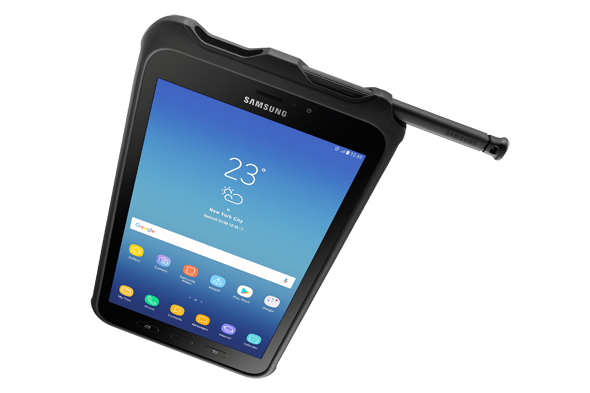
Tablets Take a Professional Turn
In recent years, the tablet’s familiar advantages—light weight, great battery time and a touchscreen—were joined by new features: top-notch cybersecurity and corporate-ready apps, creating a friendly, simple and effective work tool
In recent years, the tablet’s familiar advantages—light weight, great battery time and a touchscreen—were joined by new features: Top-notch cybersecurity and corporate-ready apps, creating a friendly, simple and effective work tool.
While first presented around eight years ago as advanced multimedia devices, capable of displaying content and games, tablets were initially not seen as tools suitable for businessman, field teams, soldiers, security personnel and businesspeople.
Samsung’s Tab Active—the latest model launched earlier this year—is now a popular tool among Israel’s security and logistics industries. As PC sales declined, and tablet sales rose, it was not beyond reason to assume that tablets would replace PC. In recent years it has become more apparent tablets and PC both have their unique advantages, and both market categories can live side by side.Changing Uses
New user requirements are a sign of the change brought on by tablets. For instance, PC makers are now trying to emulate create PCs that are instantly on.Businesses looking for devices that are flexible, mobile and productive at the same time have turned to tablets to fulfill their needs. Shipping and logistics workers, field salespeople and filed operators, have all gotten used to working with lightweight tablets.
Simple yet advanced apps, connected to a company's billing, storage, and sales infrastructure, enable employees to change and edit data on the go, via a device that gives excellent performance, long battery life, operating flexibility and high mobility. Cybersecurity—a major priority for corporations- is now a central element in new tablets, with solutions tailored specifically for the device category. Samsung is a key player in the field of secure tablet usage, with the KNOX platform, defined by market research firm Gartner as the best mobile security tool in the world. KNOX allows companies to handle operations on any device—PC, Smartphone or tablet—while keeping company data safe, without adding complexity to usage.Even national security agencies and military entities, required the highest levels of data protection, are now avid users of tablets. In many armies, tablets are standard equipment issued to soldiers on field operations.
Diversity Is Key The tablet market reacts to the very different needs of different users. Samsung launched several tablet models this year, each tailored to a different market segment. The TAB A series and the powerful, ultra-light TAB S series were created for personal entertainment, salespersons, and field activity. For security and defense organizations, Samsung created the TAB Active—a rigid, highly durable (IP67 certified) tablet, capable of operating in harsh conditions. The latter was adopted by many civic organizations as a replacement for old terminals: It is a cheaper option, more durable, more flexible and gives employees better abilities and system readiness. More and more companies choose to supply their logistic and field teams with the device. Buy One, Get Two In the last few years, a new generation of tablets combines the tablet form with MS Windows' capabilities. This market is still young, but shows great promise, exhibiting fast growth. Samsung, a pioneer in the field of Windows tablets, launched two new models this year: the 10 inch Galaxy Book and the 12 inch Galaxy Book—both equipped with the company's successful and popular features—from the security abilities to the Super AMOLED screens. Combining attractive technical capabilities with an affordable price, the 10-inch model is a popular choice among home users, students and field salespersons. The 12-inch model, a more powerful device, is a better fit for customers requiring top performance. What's Next? After coming on the market around eight years ago, tablets now take on wider roles, offering customers more diverse value propositions. No longer entertainment only devices, tablets are now used as work tools in corporations. In the coming years, these work tools are going to become a part of a wider mesh, part of the IoT revolution. Smartphones and smart watches, PCs, smart home hubs, connected cars, and tablets will communicate seamlessly, and users will be able to swiftly and easily start work on one device and move to another, whether they are watching a movie, playing a game, or working.
No Comments Add Comment